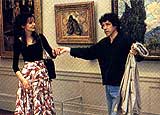Stephen Rea has pulled out all the clothes in the tiny closet
in his trailer - navy pin stripes, tropical wool blends,
dark silky shirts - and he's displaying them with conspiritorial
glee, as if it's all a mistake and someone might come in
and take them away. "Three suits
and an overcoat,"
he says, scrunching up the hound-dog furrows on his forehead
and not quite trusting his good fortune. "I don't normally
get good wardrobe." He ponders this for a moment and
offers one of his quiet, wry pronouncements. "I usually
play people from the non-wardrobe side of the tracks."
It was his stunning, Oscar-nominated performance as Fergus,
the world-weary IRA terrorist in the surprise smash
The
Crying Game, that brought Rea to this trailer on a Hollywood
studio lot squarely on the wardrobe side of the tracks.
He's in L.A. to shoot
Angie, a comedy-drama starring
Geena Davis and directed by Martha Coolidge (
Rambling
Rose). After decades of work in a traveling Irish theater
company and in small European films - including
Danny
Boy and
The Company of Wolves, both directed
by
The Crying Game's Neil Jordan - Rea, 51, has been
"discovered" in the States, and he and Hollywood
are sniffing each other out like two unacquainted but friendly
dogs in a park.
"America is a strange and wonderful
place," says Rea. "And I suppose it can exact
strange things, too."
What is exacted from him during the frenzy
of press surrounding The Crying Game nearly put
Rea over the edge. He was doing eight shows a week in
the Broadway play Someone Who'll Watch Over Me
when The Crying Game became the most talked-about
movie of '92. "I don't know how I did it," he
says. "I thought I was going to die by the time we
finished." It was exhilarating - a film he cared
deeply about, by a director with whom he'd worked twice
before, was the toast of the town.
It was also infuriating, because Rea, who was born and
raised in Belfast and still lives there, endured endless
inquiries into his personal life, fueled by The Crying
Game's subject matter (the IRA element, not the secret).
More than 20 years ago, his wife, Dolours Price, began
serving eight years for IRA-related car bombings. She
and Rea weren't together then, and now they and their
sons, Oscar, 3, and Danny, 5, live quiet, nonpolitical
lives. But that didn't stop the questions. And Rea loathed
dwelling on the subject. "The greatest thing about
Angie," he says, "is, no one can ask
me about the IRA."
 |
On the soundstage where Angie is
shooting, as Coolidge and Davis look on, Rea attempts
to cram a six-inch stack of saltines into his gaping mouth.
On what is supposed to be his last day on the set, they're
reshooting the scene - originally filmed in New York's
Metropolitan Museum - in which Rea, playing Noel, a lawyer
with an artist's soul and a twisted sense of humor, meets
a nauseated Angie (Davis), a pregnant woman from Brooklyn
who opts not to marry her boyfriend. The crackers are
Angie's, and she is about to get thrown out of the Met
for eating, Noel rushes, unwanted, to her aid.
It's the sixth take, and the cracker tower
has grown with each one. Rea angles the stack to clear
his teeth and gets it in. But now he has to say his line.
The first word sends a flurry of crumbs spewing onto Davis
and the director into a fit of laughter. First Jaye Davidson
and now this: Is there nothing Stephen Rea won't do for
his art?
When he was first offered the part of Noel, Rea turned
it down. "I liked Martha (Coolidge), and I like Geena.
The problem was, the character (a yuppie Jewish lawyer)
was only a function of the narrative," he recalls.
"The part was very colorless and kind of insipid."
But Coolidge and the film's producer, Larry Brezner, wanted
Rea. "He's very honest in his work - very warm, innately
funny, " says Coolidge. Screenwriter Todd Graff was
willing to completely rework the role to suit him. "The
part became much funnier, it got Rea-ified," Graff
says. And in the end, they were happier with the script
as a result of Rea's input. "Stephen brought us much
more than we had, " says Brezner.
 |
What they didn't quite expect was the intangible
yet undeniable Rea sex appeal. Women love him; men don't
get it. "I mean, look at him, he's not exactly...,"
says Brezner, throwing up his hands. "But no matter
who you turn to on the set, women have this thing
for him. He had his wife and kids visiting, and you've
never seen such envy. I heard comments like, "I'd
even live in Belfast.'"
Rea steps out of his cool, dark trailer into the brash
L.A. sun and surveys the activity on the studio lot. "It's
weird, Hollywood, isn't it," he says, squinting and
raising one hand to shade his pale face. "All these
people walking around in shorts with no brains."
He's kidding, of course - sort of. Rea admits that though
he loves America, he's had trouble getting a handle on
L.A. "I can't find it," he says. "The thing
I love about New York is, you walk out the door, and it's
all right there."
As he joins the cast and crew for a barbeque, Rea tries
to put his observations of America into perspective. After
living in L.A. for a couple of months, he's learned the
following: "Americans are different from any other
people." Uh-huh. How? "They don't mind jogging.
They let it all hang out." And here Rea tells a story
about a man exercising on a Malibu beach. "He was
doing this," he says, putting his hands on his hips
and jerking his head to each side, his shaggy hair narrowly
escaping the barbecue sauce on his plate. "I find
it unnerving. After all, it's not your gym, it's the Pacific
Ocean." Americans, he says, "eat so much."
He indicates the huge and varied pile of red meat in front
of him. "It has a lot to do with the land of plenty."
In Rea's case, the "plenty" has come in the
form of endless work in American films. After Angie,
he plays a journalist in Princess Caraboo, a period
romance starring Phoebe Cates and Kevin Kline. And he's
about to start what he calls "Neil's thing"
(a little project known in Hollywood as Interview with
the Vampire, directed by Neil Jordan). He's playing
the vampire Santiago, sidekick to Tom Cruise's Lestat,
and his "wardrobe" this time is the tracks,
but of the Other Side - less a question of clothing than
of prosthetics. "I had a plaster cast made of my
face," he says. "That gives you a certain amount
of time to examine your conscience." Long pause.
"I came out OK."
And after appearing as his first real villain in Interview,
he'll go on to play a not-very-nice photographer in Robert
Altman's satiric expose of the fashion world, Pret
a Porter. "Yep," Rea says, and from his
tone it's clear another of his pronouncements is on its
way. "I'm going to be a s--- for Bob Altman."
After six hours of shoving saltines into his mouth, Rea
has had about all the Hollywood glamour he can stand for
one day. When he spots Brezner yukking it up with the
crew, he assumes a quintessential pose - slumped shoulders,
right hand tucked under his left armpit, left palm flat
against his cheek - and walks over. He looks distressed.
But then again, this is the way Rea always looks. "What
happens if we don't finish today?" he asks. "Then
we'll finish tomorrow," Brezner says. Rea clenches
both fists, scrunches his face up and jumps into the air,
throwing a cartoon micro-tantrum. His contribution to
Angie was supposed to be quick; they're now midway
into the 12th week of "quick" - "twice
as long," Rea says, "as it took to shoot The
Crying Game." But this is Hollywood, and as Rea
has discovered, it's a different game entirely.
